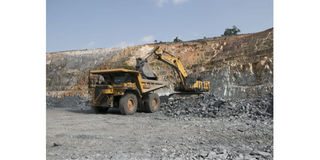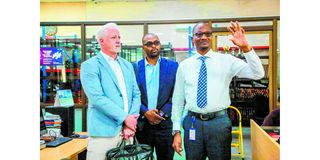Tanzania’s path to becoming East Africa’s refinery centre

The miner recently secured a $100m investment from the global resource firm BHP. PHOTO | COURTESY
What you need to know:
- An investment of $50 million in the Kabanga Project will accelerate Tanzania’s use of green technology in the value addition chain of nickel, becoming a minerals processing hub in the region
- Tanzania is home to the world’s largest development-ready nickel sulphide deposits
Dar es Salaam. Kabanga Nickel Ltd (KNL) has identified a shared vision with the government of Tanzania to make the country the epicentre of mining activities in the East African region through the use of eco-friendly value-addition technology: hydromet.
The company, which is implementing the extraction of the world’s largest development-ready nickel sulphide deposit in Tanzania, has recently secured a $100 million investment for the project from the global resource firm BHP.
Part of the investment - $10 million - was allocated to Lifezone Limited for their hydrometallurgical processing technologies which will give Tanzania the most advanced minerals processing technology.
Speaking in an interview during his visit at the Mwananchi Communications Limited headquarters yesterday, Kabanga Nickel’s chief executive officer Chris Showalter said the plan is to make Tanzania a hydromet hub in the East African region.
“We intend to be able to provide refining for multiple other mining operations in Tanzania and also as part of the government vision to make the country the centre of activities in East Africa and we think we can assist in that vision to make Tanzania a hydromet beneficiation hub for the region,” he said.
The Lifezone hydromet is said to be more cost-efficient than smelting and has a significantly lower environmental impact.
The technology will also ensure that finished Class 1 battery grade nickel, copper and cobalt will be produced in Tanzania in efforts to maximise the country’s value addition capability.
While the advanced technology would require high skilled jobs, Kabanga Nickel’s country manager Benedict Busunzu said opportunities for Tanzania would be available as they plan to also source local talents. “We will be putting in a system of operations to ensure that all the opportunities are also available for Tanzanians to take part in, and this is from the construction phase to the development of the mine,” he said.

Mwananchi Communications Ltd managing director Bakari Machumu explains a point to the Kabanga Nickel Ltd CEO, Chris Showalter (left) and the firm’s country manager, Benedict Busunzu, when the two visited the MCL Offices in Dar es Salaam yesterday. PHOTO | LOVENESS BERNARD
On the BHP investment, Mr Busunzu said it is not just the money but having such a global mining giant as a partner will be beneficial to sector development as they will ensure transfer of skills and experience.
He said with the release of $40 million directly to the project from BHP, they are now confident for the commencement of the project and delivery of the first refined nickel in Tanzania with the anticipated first production in 2025.
“Future investment tranche of $50 million in Kabanga Nickel has been agreed subject to certain conditions, and we expect within six months all the proceedings to be completed so that the second tranche can be issued,” said Mr Busunzu.
Moreover, firm’s CEO Showalter hinted that there were good prospects for future investments from BHP into the project.
“There is going to be some straightforward commercial discussion on potential pathways that we can agree on or additional investment capital in a series of tranches,” he said.
Showalter said with a market capitalisation worth nearly $165 billion, BHP has the full capabilities to support and bring the amount of capital required for the project.
Kabanga is the world’s largest development-ready high-grade nickel sulphide, unmatched in scale and grade, with more than 30 years life of mine and further exploration upside.
Ngara-based Kabanga Nickel Limited projects that the output will ramp up to target a minimum annual production of 40,000 tonnes of nickel, 6,000 tonnes of copper and 3,000 tonnes of cobalt.





